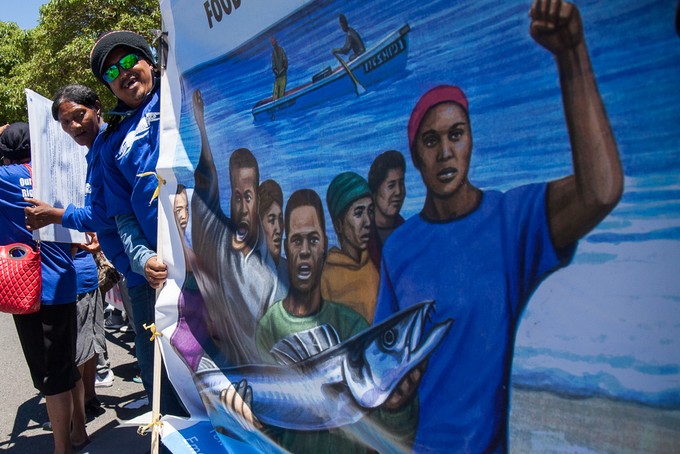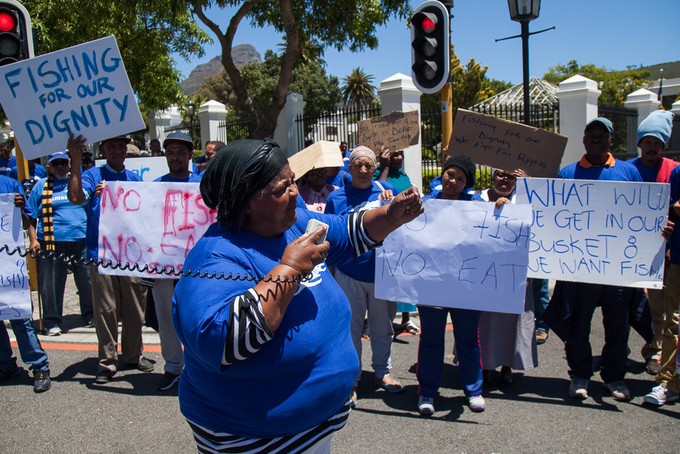Small-scale fishers demand their rights
Dozens protest at Parliament over fishing permit policy
About 50 fishers protested outside Parliament on Friday demanding that the Policy for the Small Scale Fisheries Sector (Policy) be implemented. They also called upon the Department of Agriculture, Forestry and Fisheries (DAFF) to stop prioritising bigger commercial fishers.
The Policy aims to “to provide redress and recognition to the rights of small scale fisher communities”, but despite its lofty ideals, small scale fishers believe their rights are still not being met by the state, especially when it comes to permits.
Solene Smith comes from a fishing family. She lives with five foster children, two of her own children and husband, all of whom mostly rely on fishing to get by. Three of her relatives have died at sea. Smith is also the chairperson of Coastal Links Langebaan, an organisation that fights for the rights of small-scale fishers in the Western Cape and Northern Cape. It organised the protest together with its parent organisaton Masifundise.
Smith says the fishers are angry because they’ve been struggling for years now trying to get a fair fishing policy implemented. “They give all the fish and things to the commercial people, but there’s nothing for us … There is fish, but we haven’t got a permit to fish,” she says.
In 2007, after the fishers won a case in the Equality Court, the DAFF was compelled to develop an interim relief permit system. This allocates short-term permits of between four to eight months to small-scale fishers. Almost ten years later, this temporary solution is still in effect, and beset with problems. (See Something fishy: After nine years of destructive policy delays, fishers vow to take action by Marianne Thamm in Daily Maverick.)
For one, many people are excluded from the interim policy, says Norton Dowries, Vice Chair of Coastal Links SA, Western Cape. “The Interim Relief Permit System is only there for 2,000 people … we already got more than 4,000 fishers” says Dowries.
Some people have been on the waiting list for permits for years. People who are not allocated a permit can appeal, but this is a time-consuming process, with no guarantee of success.
Another issue is the distance some people have to travel to obtain permits. Rhiaan Coetzee is a 28-year-old fisher from Ebenhaeser, a West Coast town more than 300km outside of Cape Town. In order to get to the DAFF permit office, it would take him about four hours and there are substantial travel costs.
Coetzee, who has been on the ocean with his dad since as long as he can remember, says that these permits are too short and not sustainable. “It’s not [that] I want a policy; the policy belongs to me. It’s not like I must learn to fish; I was born a fisher,” says Coetzee. He says that the sea is a way to sustain life for him, but government favours commercial fishers. “What about the real fishers?” asks Coetzee.
The protest was held during a Parliamentary Portfolio Committee meeting to discuss the implementation of the Policy.
Throughout the protest, the fishers chanted “We want our basket rights”, “We want our ocean back” and “We want our fishing rights”. They held up empty baskets to show their lack of access to fishing permits. A memorandum was handed over to Siphokazi Ndudane, Director-General of the Fisheries Branch in DAFF.
GroundUp had not received comment from DAFF by the time of publication.

Next: East London men march against women abuse
Previous: Dispute over City’s confiscation of traders’ goods
© 2016 GroundUp. 
This article is licensed under a Creative Commons Attribution-NoDerivatives 4.0 International License.
You may republish this article, so long as you credit the authors and GroundUp, and do not change the text. Please include a link back to the original article.



